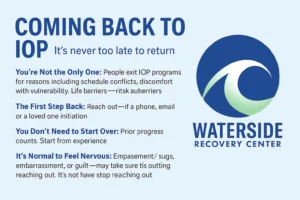Even if you’ve taken time away, the door to treatment hasn’t closed. Maybe life pulled you away from IOP. Maybe shame did. Maybe you were doing okay for a while—until you weren’t.
Whatever the reason, if you’ve been thinking about coming back, we want you to know something: it’s never too late to return.
At Waterside Recovery, we see it every week—people who paused treatment for personal, practical, or emotional reasons and are now wondering if they’re still welcome. The answer is always yes.
This blog is here to walk you through how to return to IOP—gently, safely, and without shame. Whether you left last week or last year, this guide is your soft place to land.
You’re Not the Only One Who Stepped Away
First, let’s clear this up: leaving treatment happens. A lot.
People exit IOP programs for all kinds of reasons:
- Schedule conflicts. A new job, changing shifts, or kids’ needs.
- Mental health fluctuations. Depression, anxiety, or panic attacks that made it hard to engage.
- Discomfort with vulnerability. Group can be intense, and sometimes stepping away feels safer.
- Life got in the way. Illness, housing, finances—real barriers that affect participation.
- Emotional overload. It’s common to reach a point where the work feels too heavy, too fast.
Whatever your reason, it doesn’t make you a failure. It makes you human.
We don’t expect perfection. We expect people to try—and sometimes, to try again.
The First Step Back: Just Reach Out
Reaching out after time away can feel uncomfortable. You might worry you’ll have to explain yourself. Or that we’ll be disappointed.
We won’t be. In fact, we’re glad you’re thinking about returning.
Whether you reach out by phone, email, or even ask a loved one to call for you, the first step doesn’t have to be polished. It just has to be honest.
A former client once called us and said, “I don’t know what to say. I think I need help again.” That was all we needed to hear.
You don’t need a script. Just your willingness.
You Don’t Need to Start Over—You Get to Start From Experience
One of the most common fears we hear is: “Will I have to start from scratch?”
No. The work you did before still matters. Your progress didn’t disappear.
In fact, your time away probably taught you something about yourself—what support works, what triggers you, what balance feels sustainable. When you return, we’ll use that knowledge to refine your care, not rewind it.
Think of it like this: you’re not re-enrolling. You’re re-aligning.
We’ll Build a Reentry Plan That Feels Safe
Everyone’s return looks a little different. Some people are ready to jump right back into full participation. Others need to ease in slowly.
We’ll help you build a reentry plan that works for you, which might include:
- Restarting with a reduced schedule
- Requesting a new group dynamic or time slot
- Beginning with individual therapy before returning to groups
- Shifting into our afternoon IOP program if that fits better
Whatever helps you stay connected, we’ll support it.

It’s Normal to Feel Nervous or Ashamed—But It Doesn’t Have to Stop You
Let’s name the feelings that come up when people consider coming back:
- Embarrassment
- Shame
- Fear of being judged
- Guilt over not finishing
- Anxiety about being behind
These are valid. But they’re not disqualifying.
Many of our returning clients tell us they were surprised by how relieved they felt the moment they walked back through the door.
One said, “I was bracing for a lecture. Instead, I got a smile and, ‘Hey—it’s good to see you again.’ I cried in the lobby.”
You are not your absence. Your return is what matters.
What Happens After You Call
If you’re thinking about reaching out but nervous about what comes next, here’s what to expect:
- Brief check-in or phone intake
We’ll ask how you’re doing now, what you’re hoping for, and whether your needs have changed. - Supportive reentry planning
Based on your schedule, comfort level, and past experiences, we’ll co-create a plan that helps you feel stable—without overwhelm. - Gentle reintegration
You might return to your original group, or we may recommend a new one. Either way, we’ll make the transition feel manageable. - Ongoing adjustments
Need to scale up or down after a week? No problem. We’ll keep checking in and adapting the plan with you.
Whether you’re returning to IOP in Plymouth County or looking for a nearby program like our IOP in Bristol County, the process is built to meet you where you are—not where you “should” be.
How to Talk to Yourself About Coming Back
The hardest part of returning isn’t making the call. It’s how we speak to ourselves before we do.
You might be hearing things like:
- “I already messed up.”
- “They probably don’t want me back.”
- “What if I fail again?”
Here’s how we invite you to respond:
- “Recovery includes pauses.” Stepping away doesn’t erase the path forward.
- “I’m allowed to need another try.” Healing rarely happens in a straight line.
- “They’ve seen this before—and they’re still open.” Your situation is not new to us. And you are always welcome.
FAQ: Returning to IOP After Dropping Out
Do I have to explain why I left?
No. We’ll ask how you’re doing now and what you need, but we won’t pressure you for a backstory. You’re not on trial. You’re here for support.
Will I have to start from the beginning?
Not necessarily. If you were mid-program, we’ll talk about where to pick up. Some clients choose to review previous material, but it’s not mandatory.
What if I’m embarrassed to see my old group?
We understand. If rejoining the same group feels hard, we can talk about placing you in a different one.
Can I come back even if I’ve relapsed?
Yes. Absolutely. Relapse is part of many people’s stories. We’ll meet you without shame and help assess whether IOP is still the right level of care.
Will insurance still cover my return?
Most plans allow for return episodes, especially if clinically appropriate. Our team will help verify your benefits and handle the paperwork.
What if I left a long time ago?
That’s okay. Whether it’s been weeks or years, you’re still welcome. Let’s start with where you are now.
You Don’t Need a Big Return. You Just Need to Return.
We’ve seen people walk back into IOP quietly—head down, unsure, nervous.
We’ve also seen those same people walk out a few weeks later with more clarity, more strength, and more belief in themselves.
You don’t have to wait until you feel brave. You don’t have to wait until you feel “ready.” You just have to take one step.
Call (866) 671-8620 o learn more about our IOP services in Plymouth County, MA.
We’re here when you’re ready. Or almost ready. Or even just wondering if you could be.


